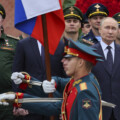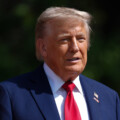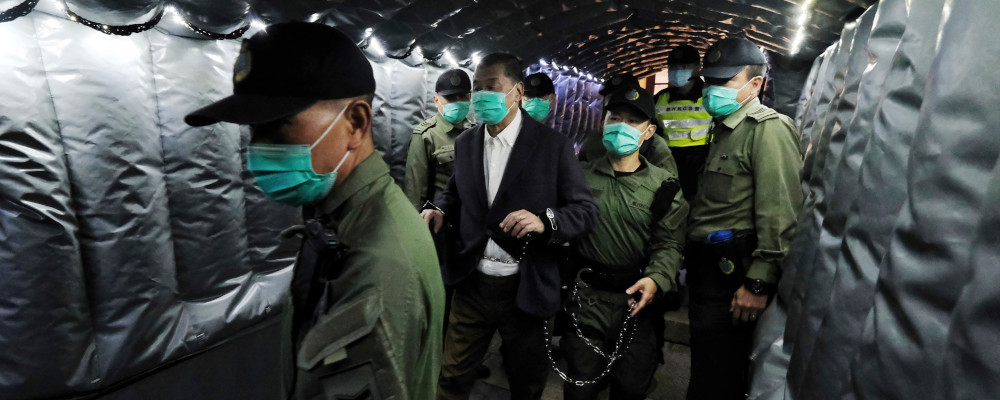In a March 2023 podcast interview, after a 45-minute discussion about her distinguished career, the purpose of equality rights, the role of appellate judges, and other standard fare, former Supreme Court Chief Justice Beverley McLachlin finally faced the elephant in the room. That elephant had become particularly awkward on the heels of Robert Fife’s astonishing reporting for the Globe on multiple CSIS leaks about China’s attempts to interfere with the Canadian electoral process. So why, exactly, was McLachlin still a sitting judge on the Hong Kong Court of Final Appeal?
McLachlin responded hesitantly, “I understand their concern. But just because people are suffering under diminution of rights, it doesn’t logically follow that you get rid of the courts…The courts have stood up to governments from time to time and said ‘No!’ Leaving the court would lead people to say, ‘See? She doesn’t think it’s a good court!’ and I don’t want to make that statement.”
The Hub’s editor-at-large Sean Speer said the quiet part out loud last week when he pointed out that one meaningful reading of the Johnson Report was a portrait of how Canada’s ruling class views China and the disastrous miscalculation of their “China consensus.” A portion of Canada’s mandarins have, at best, buried their heads in the sand as to the realpolitik of Beijing’s ambitions, and at worst been actively instrumental in its efforts to bring Canada into its circle of influence.
McLachlin is carrying an increasingly heavy and unconscionable load in Beijing’s refutation of criticisms of its growing control over Hong Kong and its judiciary. Take, for example, a recent piece in the state-run China Daily:
The Hong Kong Court of Final Appeal oversees the legal system and comprises distinguished local judges and eminent global jurists. They include two former chief justices of Australia, a former chief justice of Canada and two former presidents of the United Kingdom’s Supreme Court. This makes it very difficult for China’s antagonists to claim the city’s rule of law is on its last legs [..].
Hong Kong’s High Court, which forms part of the same judicial system to which McLachlin continues to generously lend her prestige and credibility, just rejected an application to terminate a national security trial against media tycoon Jimmy Lai. If convicted under 2020’s national security law, which forbids openly promoting democracy, Lai could spend the rest of his life in prison. The national security judges are appointed directly by Hong Kong’s chief executive John Lee, with almost no transparency. The court also blocked Lai’s British lawyer from representing him, a longstanding practice that has been viewed as helpful in insulating counsel against coercive practices and covert political threats.
Last year, former U.K. Attorney General Robert Buckland initiated a government review of Hong Kong’s judicial system. The report, which was signed by an international coalition of eminent jurists, including former Canadian Attorney General and human-rights expert Irwin Cotler, paints a bleak picture of a court that has been stripped of meaningful independence. It details that the PRC has issued its own interpretations of Hong Kong’s Basic Laws which are taken as binding by the Hong Kong court’s judges, as well as the presence of escalating threats from Hong Kong MPs to reduce the jurisdiction of the court if pro-regime judgments are not issued.
This state of affairs is no secret; it is openly trumpeted by CCP officials. Zheng Yanxiong, the director of the CCP’s Office for Safeguarding National Security, said the rule of law was an “important tool” in Hong Kong and a “source of [its] charm”, but that the independent power of the judiciary was ultimately authorised by the National People’s Congress.
Buckland’s report led former U.K. PM Liz Truss to announce that UK judges would no longer sit on Hong Kong’s court of final appeal. Two British Supreme Court judges resigned immediately following the release of Buckland’s report. Others, including McLachlin, agreed to stay on.
The most likely outcome under the court’s emaciated autonomy is that McLachlin will be assigned Potemkin dockets curated to dodge politically contentious issues, allowing her to remain under the delusion that her presence is in any way protective of the rights of Hong Kongers and the regime to continue siphoning off Canada’s brand image.

McLachlin’s assertion that her presence acts as a bulwark against the further erosion of rights beggars belief. The rule of law and the application of legal rules cannot be divorced from ultimate questions of power and enforcement. Moreover, Canada’s situation vis-a-vis China is now too explicitly fraught for McLachlin’s bromides about resisting China’s rights abuses to be entertained. Legal theorist Carl Schmitt famously claimed that “the specific political distinction…is that between friend and enemy.”
To be clear, the PRC is now explicitly no friend of Canada. It has detained innocent Canadian citizens, threatened the family of a distinguished parliamentarian in an effort to intimidate and silence him, and built well-established networks of funding for sympathetic MPs in the hopes of advancing its ambitions. Johnston’s report does absolutely nothing to diminish these allegations; it just demonstrates a level of inconceivable dysfunction and disorganization on the part of Canada’s ruling class (”significant governance shortcomings”, in Johnston’s parlance).
Beverley McLachlin is a fine jurist and her good intentions are no doubt held sincerely. But the calculus has changed in light of this year’s revelations of the extent of China’s lack of regard for the rights of both its own citizens and that of Canadians. It’s time to come home.
Recommended for You

Need to Know: Mark Carney’s digital services tax disaster

Kirk LaPointe: B.C.’s ferry fiasco is a perfectly Canadian controversy

‘Putin has no intention of stopping this war’: Sir Bill Browder on three years of war in Ukraine and how Russia is evading sanctions

Ian Holloway: The Supreme Court is ditching its iconic red robes. Yes, it matters




